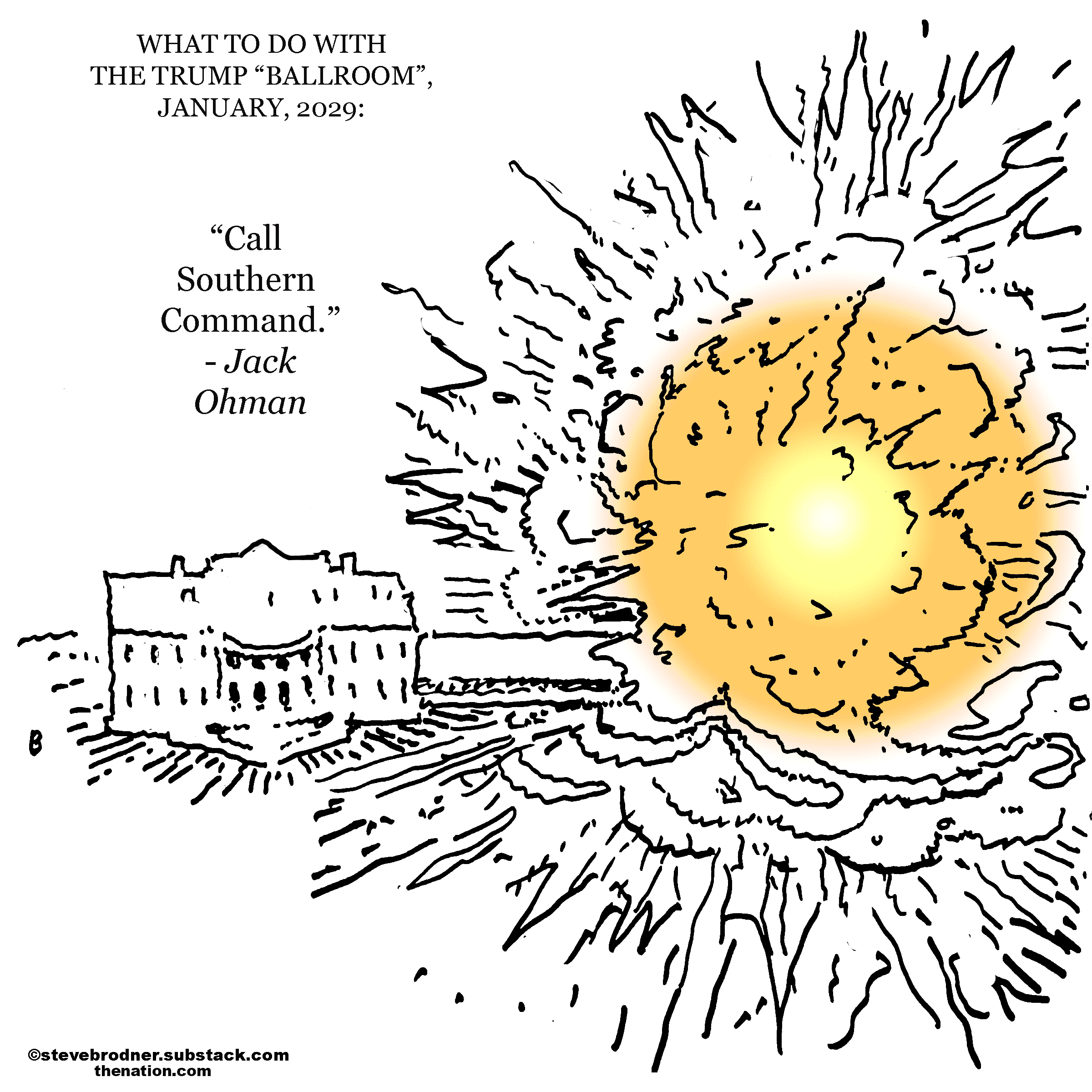The Shame of the Senate
Only 11 senators joined Bernie Sanders’s effort to hold Israel to account for human rights abuses in Gaza.

Bernie Sanders during the debate on his Gaza resolution on January 16, 2024.
(YouTube)Senator Bernie Sanders made a simple request of the United States Senate on Tuesday. In the face of Israel’s overwhelming military assault on Gaza, which has left more than 24,000 people dead, severely injured tens of thousands more, and displaced almost 2 million men, women, and children, Sanders asked his colleagues: “Do you support asking the State Department whether human rights violations may have occurred using U.S. equipment or assistance in this war?”
“This is information Congress should have and, whatever your views on this war, this resolution should be something you can support,” Sanders told the Senate. “If you believe that the campaign has been indiscriminate, as I do, then we have a responsibility to ask this question. If you believe Israel has done nothing wrong, then this information should support that belief.”
By this logic, the vote should have been 100-0. After all, the US Constitution, which senators swear to uphold, outlines oversight responsibilities that, at a bare minimum, require legislators to know what is being done with the weapons that this country supplies to a foreign state. Additionally, as Sanders reminded the Senate, there is an urgent need for congressional intervention:
“First, it is necessary because of the scale of the destruction in Gaza, the indiscriminate nature of the military campaign, the humanitarian catastrophe that is now occurring and the limits on humanitarian access—food, water, medical equipment and fuel. Second, because of the extensive use of US weapons in attacks that have killed thousands of civilians. Much of the destruction that has taken place in Gaza has been done with US weapons.”
But logic did not prevail.
The Sanders resolution, which would have begun a process that could have led to a freezing of military aid to Israel under the dictates of the Foreign Assistance Act, was overwhelmingly rejected —on a 72-11 vote—as a majority of senators chose neglect and ignorance over constitutional duty and informed engagement.
The progressive group Justice Democrats summed things up succinctly when it observed that, on a basic question of transparency, Congress “spectacularly failed.”
The failure—the shame—was bipartisan. Of the 72 votes to shut down debate on the issue, the clear majority of them—37—came from Democrats, including that of majority leader Chuck Schumer (D-N.Y.), and even that of Senate whip Dick Durbin (D-Ill.), who, unlike Sanders and most of the senators who voted for the resolution, had previously spoken out in favor of a cease-fire in Gaza. Two independents who caucus with the Democrats (Angus King of Maine and Kyrsten Sinema of Arizona) also voted to table the resolution, as did 33 Republicans, including minority leader Mitch McConnell (R-Ky.). Seventeen senators—an uncommonly high number—failed to vote, including two Democrats: Chris Coons of Delaware, a close ally of President Biden, and Brian Schatz of Hawaii. (In a statement following the vote, Schatz said that he would have supported the resolution had he been in attendance. He described the resolution as “so far the only available avenue to register our concerns with both the Israeli government’s conduct of the war—which has resulted in over 24,000 civilian casualties—and the undermining of civilian oversight over arms transfers.”)
Sanders, the independent senator from Vermont who caucuses with Senate Democrats, was joined by one Republican, Kentuckian Rand Paul, in his fight to open a debate on the oversight issues. Nine Democrats also supported the effort: Laphonza Butler of California, Martin Heinrich of New Mexico, Mazie Hirano of Hawaii, Ben Ray Lujan of New Mexico, Ed Markey of Massachusetts, Jeff Merkley of Oregon, Chris Van Hollen of Maryland, Elizabeth Warren of Massachusetts, and Peter Welch of Vermont.
Those “yes” votes form a “profile in courage” honor roll of senators who have decried the brutal October 7 attack by Hamas on Israel but who also recognize that Israel can and should be held to account for its disproportionate response to that attack.
Unfortunately, the honor roll is far too short.
“By voting to halt debate on Senator Sanders’ 502B resolution, S.Res.504, the Senate ducked its responsibility to ensure that respect for human rights and protection of people caught up in conflict remains at the center of U.S. foreign policy,” explained Stephen Miles, the president of the group Win Without War. Miles continued:
“Passing S.Res.504, which invokes a little-known section of the Foreign Assistance Act to request a simple human rights report over the Israeli government’s actions in Gaza and the West Bank, was a no-brainer. It would have compelled the administration to do what it has publicly dodged so far: formally assess whether the Israeli government is violating human rights, which it is already legally obligated to do as it rushes weapons into the conflict. With the deepening of a humanitarian catastrophe and regional crisis that will impact U.S. global standing for years to come, this push for oversight was both necessary and the bare minimum Congress could take up at the moment.”
Miles argued, correctly, that the debate is far from finished: “[The] scale of destruction in Gaza, in addition to the thousands on the street calling for an end to the war, will force this debate back into the Senate’s agenda sooner or later. In the not-too-distant future, even those who opposed this resolution today will act confused at how a majority of the Senate failed to pass such a straightforward request for information.”
Popular
“swipe left below to view more authors”Swipe →Miles is right. This issue is not going away. The senators who voted for the resolution are a base that can be built upon—along with the roughly 60 House members who have endorsed a cease-fire. History reminds us that this is a bigger base than foes of the Vietnam War had in 1964, when only Senators Wayne Morse (D-Ore.) and Ernest Gruening (D-Alaska) cast lonely votes against the Gulf of Tonkin Resolution.
That’s not a reason to celebrate. That’s a reason to redouble efforts, in the streets and in the Congress, to stop the killing in Gaza—killing for which the United States bears substantial responsibility, as a source of weapons and diplomatic cover for the right-wing government of Israeli Prime Minister Benjamin Netanyahu. “This is a tragedy in which we, the United States of America, are complicit,” Sanders told the Senate on Tuesday. “Much of what is happening right now is being done with US arms and equipment. In other words, whether we like it or not, the US is complicit in the nightmare that millions of Palestinians are now experiencing.”
Disobey authoritarians, support The Nation
Over the past year you’ve read Nation writers like Elie Mystal, Kaveh Akbar, John Nichols, Joan Walsh, Bryce Covert, Dave Zirin, Jeet Heer, Michael T. Klare, Katha Pollitt, Amy Littlefield, Gregg Gonsalves, and Sasha Abramsky take on the Trump family’s corruption, set the record straight about Robert F. Kennedy Jr.’s catastrophic Make America Healthy Again movement, survey the fallout and human cost of the DOGE wrecking ball, anticipate the Supreme Court’s dangerous antidemocratic rulings, and amplify successful tactics of resistance on the streets and in Congress.
We publish these stories because when members of our communities are being abducted, household debt is climbing, and AI data centers are causing water and electricity shortages, we have a duty as journalists to do all we can to inform the public.
In 2026, our aim is to do more than ever before—but we need your support to make that happen.
Through December 31, a generous donor will match all donations up to $75,000. That means that your contribution will be doubled, dollar for dollar. If we hit the full match, we’ll be starting 2026 with $150,000 to invest in the stories that impact real people’s lives—the kinds of stories that billionaire-owned, corporate-backed outlets aren’t covering.
With your support, our team will publish major stories that the president and his allies won’t want you to read. We’ll cover the emerging military-tech industrial complex and matters of war, peace, and surveillance, as well as the affordability crisis, hunger, housing, healthcare, the environment, attacks on reproductive rights, and much more. At the same time, we’ll imagine alternatives to Trumpian rule and uplift efforts to create a better world, here and now.
While your gift has twice the impact, I’m asking you to support The Nation with a donation today. You’ll empower the journalists, editors, and fact-checkers best equipped to hold this authoritarian administration to account.
I hope you won’t miss this moment—donate to The Nation today.
Onward,
Katrina vanden Heuvel
Editor and publisher, The Nation
More from The Nation


The Supreme Court Has a Serial Killer Problem The Supreme Court Has a Serial Killer Problem
In this week's Elie v. U.S., The Nation’s justice correspondent recaps a major death penalty case that came before the high court as well as the shenanigans of a man who’s angling...

Corporate Democrats Are Foolishly Surrendering the AI Fight Corporate Democrats Are Foolishly Surrendering the AI Fight
Voters want the party to get tough on the industry. But Democratic leaders are following the money instead.

Marching Against a Corrupt Regime Marching Against a Corrupt Regime
People taking to the streets for democracy.

It Would Be Madness to Give Trump and His Toadies Even More Power It Would Be Madness to Give Trump and His Toadies Even More Power
And yet, that’s what the Supreme Court appears prepared to do.

Trump Is Dragging Republicans to Crushing Defeat After Crushing Defeat Trump Is Dragging Republicans to Crushing Defeat After Crushing Defeat
The president is deeply unpopular, his policies are failing, and Republicans are losing—everywhere.


